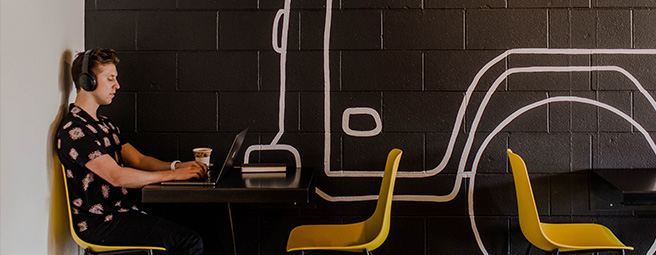
How Freelance Designers Leverage Virtual Office Services: 6 Use Cases
Freelancer workers are a critical linchpin in today’s gig-driven economy. Past reports predicted freelancers will comprise half of the U.S. workforce by 2030. A new report by Fiverr indicates the freelancer marketplace may be growing at a faster rate than expected—at least in the top 25 U.S. freelance markets. One in five freelancers in these markets work in creative services, with graphic designers comprising one of the fastest growing groups.
Freelance Designers in High Demand
This rapid growth for freelance designers is tied to fast-growing demand for promotional and marketing collateral—from small to large organizations. Increasingly, these organizations elect to outsource their graphic design work to skilled freelancers. And even in instances where they choose to hire full-time resources, organizations often need to supplement their permanent teams with freelancers for additional scale.
Simply hanging out a shingle and working from a cramped living room or even a home office is often not the best option for a freelance designer. Instead, freelance designers need to look to virtual office services. What some freelancers such as graphic designers mistake is that all virtual offices are the same. But they are not the same—especially when “services” is appended. Virtual office services consist of not only day offices and coworking space where freelance designers can focus on their creative work without distractions that crop up in home living rooms and offices, but they also include much more.
Ways Freelance Designers Can Leverage Virtual Office Services
So, what are virtual office services, and how can busy freelance designers leverage them? The following are some of the prevalent reasons:
1. Virtual Addresses
There are a number of reasons why freelance designers should not use their home addresses. At the top of the list is the reality that having clients know where you live is not something that freelancers want—from having a client show up unexpectedly during dinner or over a weekend to having them know what type of home you own. Personal and family privacy rank high on the list. Second, some home addresses cannot be used as a business address. Apartments and condo complexes may restrict the ability of residents to run a business out of their homes. Some single-family homes have home owners’ association (HOA) rules that restrict home businesses. Finally, some cities may have municipality codes that restrict or prohibit home owners from running a commercial business from their homes.
As an alternative, virtual office services give freelance designers the ability to secure professional addresses in highly sought-after locations. These come with services that include mail receipt and forwarding, a lobby directory listing, entity formation services, and more.
2. Professional Networking
Virtual offices offer freelance designers an opportunity to network with other professionals. These interactions may simply provide them with support and ideas. But they also can lead to new business opportunities—expanded business with existing clients and business with new clients. Coworking spaces, for example, give like-minded businesses a forum for collaboration between disruptive entrepreneurial startups. In the case of freelance designers, this might be a chance to partner with other professionals who possess content marketing, demand-gen, or data analytics skillsets; the end result being a comprehensive solution offering that includes graphic design as one element.
3. Lobby Greeter
The presence of a lobby greeter turns an entrepreneur or small business from amateur status to professional. Lobby greeter welcome visitors to the office and provide them with assistance and information. This affords positive brand impressions. Lobby greeters also help entrepreneurs and small businesses by routing inquiries and visitors to the correct member of the team and facilitating administrative support as needed. This helps them to focus on running their business and serving their clients.
4. Meeting Rooms
Freelance designers do not have professional meeting rooms at their ready when working from home offices. As graphic design is still a palatable experience that often requires engaged interaction with a client, the chance to meet with a client in a quiet setting—with all of the presentation and meeting accoutrements at their disposal—is a huge value.
Often, design freelancers elect to meet clients in coffee shops. But these are loud, disruptive, and lack privacy. Meetings in coffee shops thus disappoint—in terms of outcomes and client impressions. Hotel conference rooms are sometimes viewed as an option. However, they are twice as expensive as rented meeting rooms that come with a virtual office service, and they do not have lobby greeters or administrative services.
5. Presentation Tools
When using meeting rooms, freelance designers need presentation tools such as whiteboards, flipcharts, overheads, and audio and video conferencing capabilities. Virtual office services come with all of these and moreover lobby greeters can help freelance designers when they need help obtaining and configuring the right presentation tools.
6. Administrative Services
Running a business requires sustained time and focus. It also can entail a lot of administrative work that creates distractions and consumes valuable time and energy. Administrative services, which come with virtual office services, helps plug these gaps, enabling entrepreneurs and small businesses to focus on their businesses and clients. Administrative work, such as faxing, confirming meetings, and arranging catering services for meetings, can be handled through virtual office services staff. For freelance designers, who want to spend their time designing layouts and videos, this is invaluable support. They no longer need to worry about faxing documents, ensuring logistical support for clients arriving on site, finding someone to notarize documents, or arranging catering for a critical meeting.

LinkedIn Profile: LinkedIn
Website: www.tirocommunications.com
Categories
- Business Marketing
- Business Resources
- Customer Success Stories
- Customer Success Stories: Communications
- Customer Success Stories: Meeting Rooms
- Customer Success Stories: Virtual Office
- Entrepreneur Tools
- Management
- Meeting Rooms
- Virtual News
- Virtual Office
- Virtual Receptionist Services
- Workplace Culture
Subscribe to Our Blog
Archive

- April 2024
- March 2024
- February 2024
- January 2024
- December 2023
- November 2023
- October 2023
- September 2023
- August 2023
- July 2023
- June 2023
- May 2023
- April 2023
- March 2023
- February 2023
- January 2023
- December 2022
- November 2022
- October 2022
- September 2022
- August 2022
- July 2022
- June 2022
- May 2022
- April 2022
- March 2022
- February 2022
- January 2022
- December 2021
- November 2021
- October 2021
- September 2021
- August 2021
- July 2021
- June 2021
- May 2021
- April 2021
- March 2021
- February 2021
- January 2021
- December 2020
- November 2020
- October 2020
- September 2020
- August 2020
- July 2020
- June 2020
- May 2020
- April 2020
- March 2020
- February 2020
- January 2020
- December 2019
- November 2019
- October 2019
- September 2019
- August 2019
- July 2019
- June 2019
- May 2019
- April 2019
- March 2019
- February 2019
- January 2019
- December 2018
- November 2018
- October 2018
- September 2018
- August 2018
- July 2018
- June 2018
- May 2018
- April 2018
- March 2018
- February 2018
- January 2018
- December 2017
- November 2017
- October 2017
- September 2017
- August 2017
- July 2017
- June 2017
- May 2017
- April 2017
- March 2017
- February 2017
- December 2016
- November 2016
- October 2016
- September 2016
- August 2016
- July 2016
- June 2016
- May 2016
- April 2016
- March 2016
- February 2016
- January 2016
- December 2015
- November 2015
- September 2015
- August 2015
- July 2015
- June 2015
- April 2015
- March 2015
- February 2015
- January 2015
- December 2014
- November 2014
- October 2014
- September 2014
- August 2014
- July 2014
- May 2014
- April 2014
- March 2014
- January 2014
- December 2013
- October 2013
- September 2013
- August 2013
- June 2013
- April 2013
- February 2013
- January 2013
- December 2012
- November 2012
- October 2012
- September 2012
- August 2012
- July 2012
- June 2012
- May 2012
- April 2012
- March 2012
- February 2012
- January 2012
- December 2011
- November 2011
- October 2011
- September 2011
- April 2011
- March 2011
- January 2011
- December 2010
- October 2010
- September 2010
- July 2010
- June 2010
- April 2010
- March 2010
- January 2010
Services
Virtual Offices Virtual Office Features What is a Virtual Office? Full Time Spaces Live Receptionist Live Receptionist Features Auto Receptionist Live Web Chat Meeting Spaces Meeting Space Features Coworking Spaces Event Spaces Marketplace Incorporation Services Search Virtual Office Services Near MeInstant Group
- © 2024 Davinci virtual office







